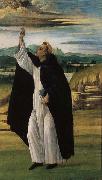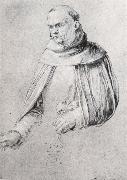Wholesale Oil Painting Reproductions No Minimum and Door to Door! |
|||||||||||
|
|
|||||||||||

|
|||||||||||
|
|
|
||||||||
All Alessandro Botticelli Oil Paintings |
||||||||
|
|
||||||||
|
|
||||||||
|
Artist Introduction: Florence ca.1445-1510
Italian painter and draughtsman. In his lifetime he was one of the most esteemed painters in Italy, enjoying the patronage of the leading families of Florence, in particular the Medici and their banking clients. He was summoned to take part in the decoration of the Sistine Chapel in Rome, was highly commended by diplomatic agents to Ludovico Sforza in Milan and Isabella d'Este in Mantua and also received enthusiastic praise from the famous mathematician Luca Pacioli and the humanist poet Ugolino Verino. By the time of his death, however, Botticelli's reputation was already waning. He was overshadowed first by the advent of what Vasari called the maniera devota, a new style by Perugino, Francesco Francia and the young Raphael, whose new and humanly affective sentiment, infused atmospheric effects and sweet colourism took Italy by storm; |
||||||||
|
|
||||||||
|
St.Dominic Painting ID:: 29211 |
mk65
Tempera and oil on canvas
transferred from panel
17 1/2x10"
|
|||||||
Height Width |
INS/CM Quality |
|||||||
|
X |
| |||||||
|
|
||||||||
All Albrecht Durer Oil Paintings |
||||||||
|
|
||||||||
|
|
||||||||
|
Artist Introduction: b.May 21, 1471, Imperial Free City of Nernberg [Germany]
d.April 6, 1528, Nernberg
Albrecht Durer (May 21, 1471 ?C April 6, 1528) was a German painter, printmaker and theorist from Nuremberg. His still-famous works include the Apocalypse woodcuts, Knight, Death, and the Devil (1513), Saint Jerome in his Study (1514) and Melencolia I (1514), which has been the subject of extensive analysis and interpretation. His watercolours mark him as one of the first European landscape artists, while his ambitious woodcuts revolutionized the potential of that medium. D??rer introduction of classical motifs into Northern art, through his knowledge of Italian artists and German humanists, have secured his reputation as one of the most important figures of the Northern Renaissance. This is reinforced by his theoretical treatise which involve principles of mathematics, perspective and ideal proportions.
His prints established his reputation across Europe when he was still in his twenties, and he has been conventionally regarded as the greatest artist of the Renaissance in Northern Europe ever since. |
||||||||
|
|
||||||||
|
|
St.Dominic Painting ID:: 42282 |
mk168
416x288mm
Vienna
|
||||||
Height Width |
INS/CM Quality |
|||||||
|
X |
| |||||||
|
|
||||||||
|
Prev Next
|
||||||||
|
|
||||||||
|
Related Paintings to Albrecht Durer :. |
||||||||
|
|
||||||||
|
CONTACT US |


